The 2020 road season in numbers
It was a small miracle there was even a 2020 road season, Cyclingnews looks at the stats
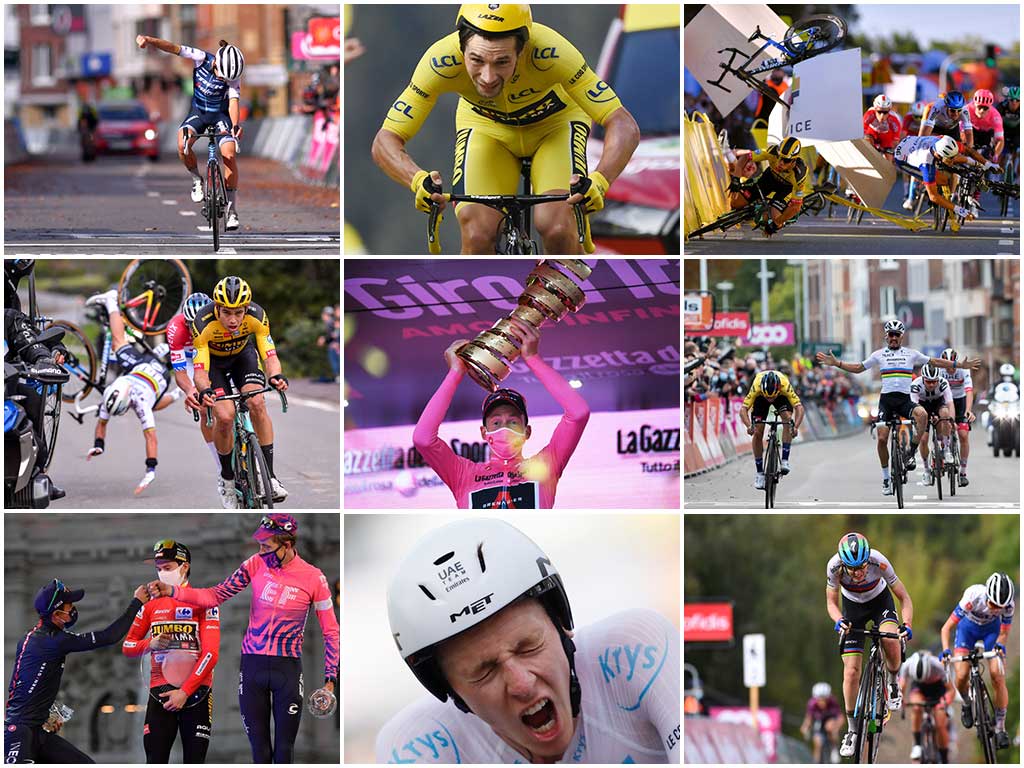
The latest race content, interviews, features, reviews and expert buying guides, direct to your inbox!
You are now subscribed
Your newsletter sign-up was successful
It was a small miracle that there was a 2020 road season. The global coronavirus pandemic forced the cancellation of every pro race in North America but thanks to Europe's strict lockdowns in the spring and the fortitude of the UCI, race organisers, teams, sponsors and brave riders, cycling ultimately enjoyed a thrilling if not highly unusual racing season.
The year began as usual with the Santos Tour Down Under in the warmth of Australia, where Richie Porte took his second career overall victory, and with Remco Evenepoel's dominant win in the Vuelta a San Juan.
There were concerning reports about a new contagion spreading from China - a new SARS virus - when Sergio Higuita claimed the Tour Colombia 2.1 but the case counts were still quite small. By the end of the year, COVID-19 would claim two million lives and infect at least 82 million people worldwide. It threatened economies, changed the way we live but put more people on bicycles than ever before.
With a public hungry for entertainment at home, sports became more important than ever and pro cycling delivered in spades: three of the closest Grand Tours since 1989, some of the most thrilling editions of the Classics and a profoundly impressive year for double world champion Anna van der Breggen.
Cyclingnews looks back at the year in numbers.
3,000
The number of confirmed coronavirus cases worldwide when the first pro cycling event was postponed. The Tour of Hainan was called off on January 27, 2020 - six weeks before the World Health Organisation declared the COVID-19 outbreak a pandemic. Hainan, some 1500km away from the epicentre of the outbreak, already had 33 confirmed cases. There were just 37 confirmed cases outside of China and 11 countries affected but in retrospect, the virus was already circulating undetected in many more countries than that.
82,294
The number of confirmed COVID-19 cases worldwide when the first riders tested positive for the virus at the UAE Tour on February 27.
The latest race content, interviews, features, reviews and expert buying guides, direct to your inbox!
Racing came to an abrupt halt as Adam Yates (Mitchelton-Scott) was in the lead ahead of eventual Tour de France winner Tadej Pogacar (UAE Team Emirates). The virus was already giving RCS Sport concern over Milan-San Remo, Strade Bianche and Tirreno-Adriatico as Italian officials locked down the Lombardy region around an outbreak there.
The COVID-19 positives at the UAE Tour highlighted the dangers riders could face if racing continued as the entire entourage was confined to the race hotel for several days. One staff member fell seriously ill and others who were infected or teams who had close contact with them, were kept in isolation for weeks until they were finally clear of the virus.
8
The number of WorldTeams that pulled out of racing before Paris-Nice.
Astana, Jumbo-Visma, Mitchelton-Scott, Ineos, CCC Team, AG2R La Mondiale, Movistar and UAE Team Emirates pre-empted the race stoppage by refusing to risk the health and the safety of their riders and staff.
Paris-Nice went on 'behind closed doors' but ended one day early to avoid the race finishing in Nice.
139
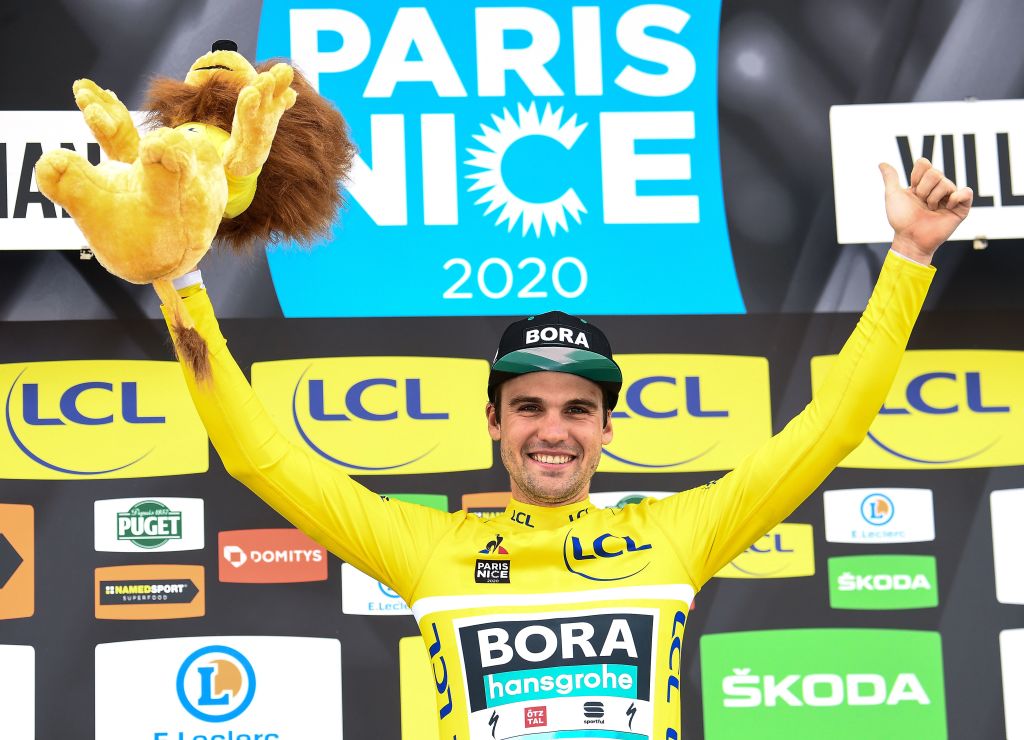
The number of days between the contentious end to Paris-Nice, won by Max Schachmann (Bora-Hansgrohe), and the eventual return to racing in the summer.
Paris-Nice slid in under the closing gates like Indiana Jones - just as all of Europe fell under severe lockdowns. Racing stopped and riders who were in Spain and Italy were not even allowed to train outdoors as COVID-19 became a global pandemic.
182
The elite women had an even longer break because of the coronavirus, with 182 days between Liane Lippert's victory in the Cadel Evans Great Ocean Road Race and Annemiek van Vleuten's win in Strade Bianche in August.
The Women's WorldTour had already lost the Tour of California Women's Race that went 'on hiatus' at the end of 2019.
6 hours 59 minutes
Everesting did not end with Alberto Contador and then Ronan McLaughlin's records in July.
Sean Gardner was the first rider to go under the seven-hour mark in October on a 15.5% grade climb in Luray, Virginia. The American's efforts were overshadowed by the compressed WorldTour, however. He set the record on October 3, on the same day Filippo Ganna won the opening stage of the Giro d'Italia.
21
Eventually, the powers behind professional cycling decided that cancelling the entire season was not an option.
The sport depended upon sponsors and those companies were already struggling. Riders were taking pay cuts, staff were on furlough and the already tenable business model for the sport would collapse without races.
The Grand Tour organisers ASO, RCS Sport and Belgian organisers Flanders Classics led the way and 21 of the 38 WorldTour races were rescheduled.
11
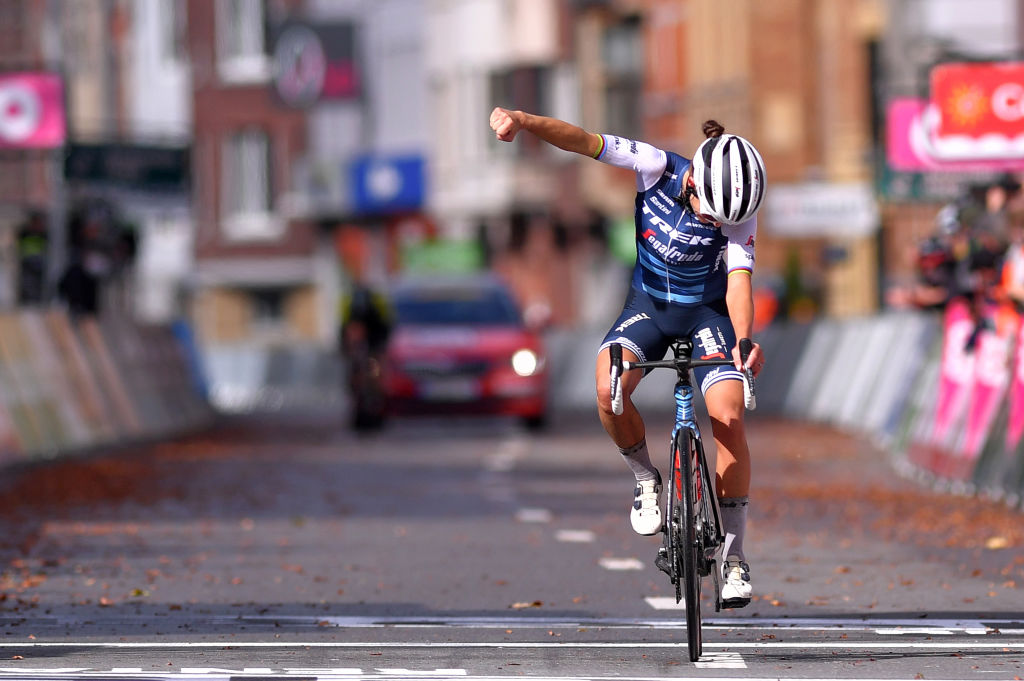
The women's calendar took a big hit but 11 of the 23 events went on, with Lizzie Deignan taking the overall series and Trek-Segafredo emerging as best team.
Deignan won the GP de Plouay, La Course by le Tour de France and Liège-Bastogne-Liège to top the rankings ahead of teammate Elisa Longo Borghini. Liane Lippert, also Trek-Segafredo, was the best young rider.
130
In one of the first races after the coronavirus break, Fabio Jakobsen was taken out in a crash at the Tour de Pologne when Dylan Groenewegen moved across the road in the sprint. He suffered massive facial injuries that required 130 stitches.
Substandard barriers and the high speeds of a downhill finish contributed to the severity of his injuries - the barriers collapsed and his face took the brunt of the impact - but so far Groenewegen has shouldered most of the blame.
With a shattered palate, only one tooth left, a fractured skull and concussion, it is a miracle Jakobsen lived to tell his story.
40.67
The average time gap between winner and runner-up in the three Grand Tours this year.
2020 had the closest Grand Tours since a 39-second average winning margin in 1989, the year Greg LeMond won the Tour by eight-seconds over Laurent Fignon.
Tadej Pogacar had the biggest victory gap of the three when he won the Tour de France by 59 seconds over Primoz Roglic. Tao Geoghegan Hart won the Giro d'Italia by just 39 seconds over Jai Hindley, and Roglic won the Vuelta a España by a thin 24 seconds over Richard Carapaz.
In a normal year, the average winning margins of the three Grand Tours are minutes wide, although the competition has become more even in recent years.
80
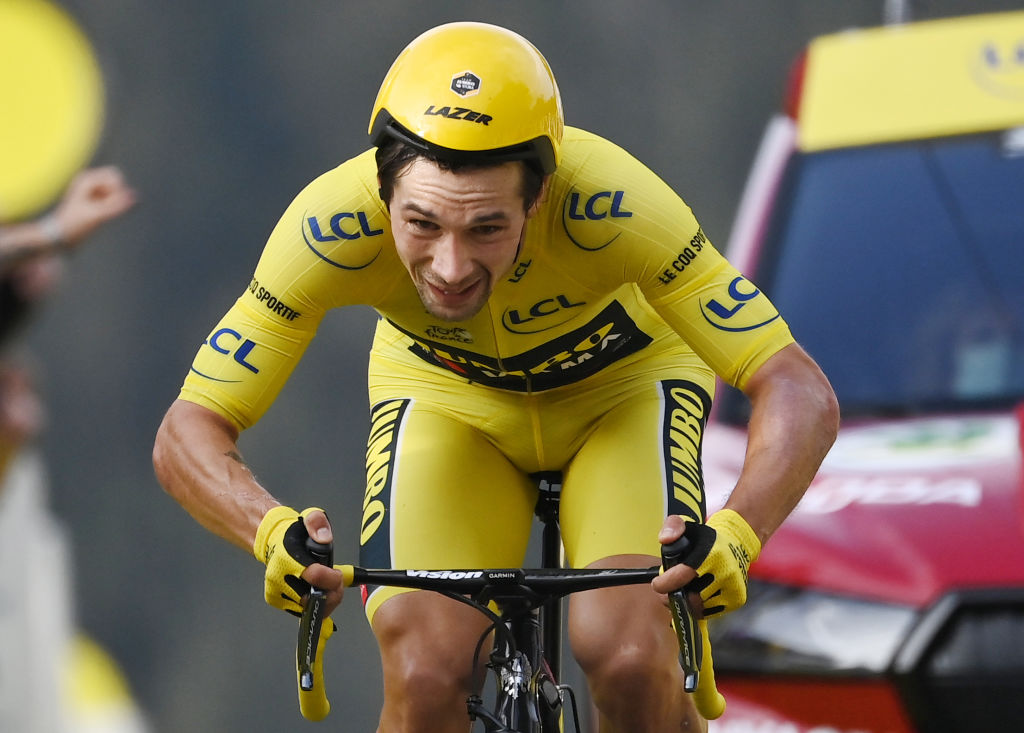
Poor Primoz Roglic: he was leading the Tour de France until stage 20 and, normally a favourite for an individual time trial, few expected to see his 57-second lead over Tadej Pogacar evaporate as fast as it did on La Planche des Belles Filles.
Roglic lost 80 seconds on the climb, losing another 36 on the flat run-in to the base of the 6km ascent.
The look of desperation on Roglic's face as he struggled up the steep final few hundred metres was painful for everyone to watch, even more so for his teammates.
He some what made up for it with the overall victory in the Vuelta a España but that day in the Tour de France and those 80 seconds will be hard to forget.
26.85
If it felt like younger riders dominated in 2020, the numbers bear that out: the average age of UCI's top 20 ranked men was just 26.85 years compared with 28.8 in 2019.
Although the number one rider, Primoz Roglic, is 31, 22-year-olds Tadej Pogacar, Marc Hirschi and João Almeida together with 20-year-old Remco Evenepoel skewed the average lower this year.
Jakob Fuglsang and Richie Porte at 35 and 31-year-old Diego Ulissi were the only riders over 30 in the top of the World Rankings other than Roglic.
Riders we still consider young, Wout van Aert and Mathieu van der Poel (26 and 25, respectively) were about the average age for the best finishers this year.
11,432.8
Sam Bennett (Deceuninck-Quickstep) clocked the most racing kilometres this season at 11,432.8 (according to CQ Ranking). The Irishman had a busy early season, racing the Tour Down Under, Race Torquay and Cadel Evans Great Ocean Road Race before heading to the UAE Tour and Paris-Nice.
He was also back in action early when racing resumed in summer, taking on the Vuelta a Burgos, Milan-San Remo, Tour de Wallonie. He sandwiched the sprinters' Classics Scheldeprijs and Gent-Wevelgem in between the Tour de France and Vuelta a España. It was a jam-packed year for the Tour de France green jersey winner but still about 3,000km less than riders see in a normal year.
14
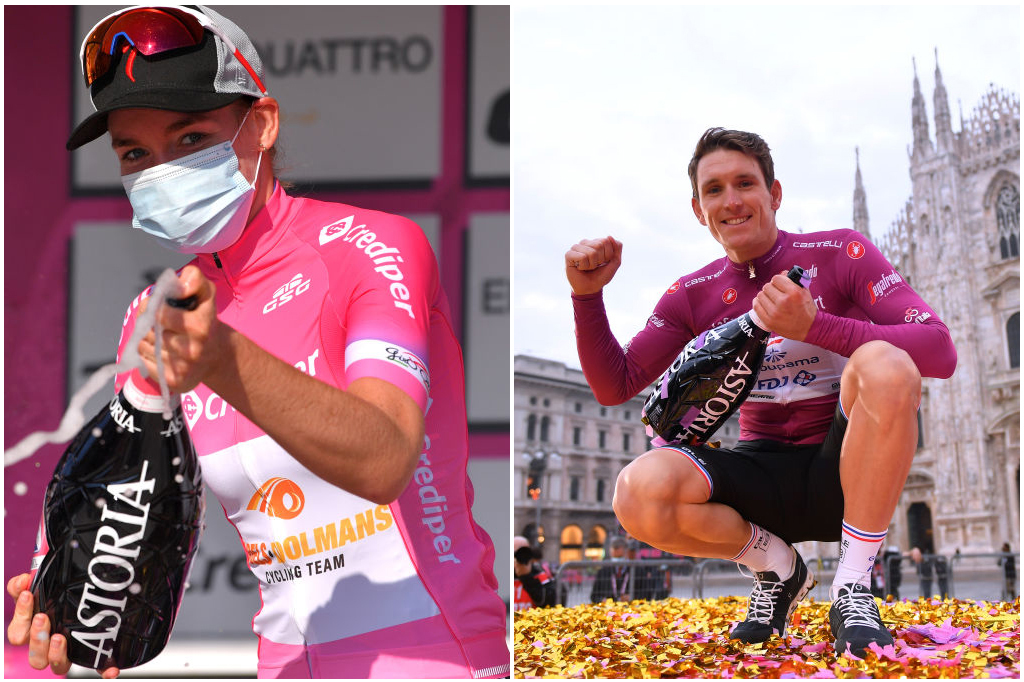
Arnaud Demare (Groupama-FDJ) won the most races of any rider this season, taking home four stages of the Giro d'Italia and the points classification.
He also won the French national championships, the Tour de Wallonie and two stages, the Tour Poitou-Charentes and three stages, Milano-Torino and a stage in the Tour of Luxembourg.
Also 14, the number of victories secured by Boels Dolmans, who won the most races in the women's peloton, even if Trek-Segafredo scored more points.
Four of the Dutch team's wins came in national championships, with Christine Majerus (Luxembourg) taking both road and time trial titles, Amalie Dideriksen (Danish TT), and Anna van der Breggen (Dutch road race) adding to the tally of UCI race wins.
Chantal van den Broek-Blaak's victories in the Tour of Flanders and Le Samyn, Jolien D'hoore's victory in Gent-Wevelgem all padded a tally dominated by Van der Breggen. Double World Championship titles added to wins in La Flèche Wallonne, the Giro Rosa and Setmana Ciclista Valenciana completed an outstanding season for Van der Breggen and Boels Dolmans.
Van der Breggen had the most victories of the women's peloton with eight, one more than compatriot Annemiek van Vleuten (Mitchelton-Scott).
5
There were five riders to claim their first WorldTour victories this season, a number well down from the dozen riders to enjoy their first major success in 2019.
Two Colombian teammates - Ruben Guerreiro and Jonathan Caicedo (EF Pro Cycling) - found success in the Giro d'Italia, while Marc Hirschi (Team Sunweb) nabbed his first in the Tour de France.
Lennard Kamna (Bora-Hansgrohe) had his first taste of stepping atop a WorldTour podium in the Critérium du Dauphiné while Matthew Holmes (Lotto Soudal) was the first debutant winner of the season at the Tour Down Under.
40
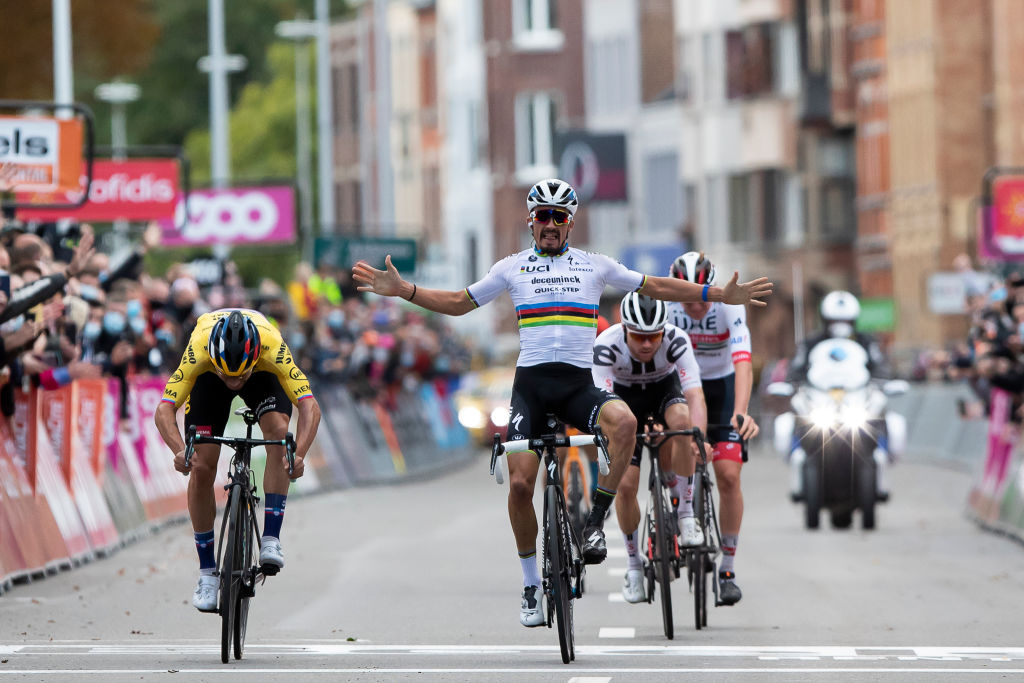
Deceuninck-Quickstep dominated the men's calendar with 40 victories this season, eight more than UAE Team Emirates and 17 more than Jumbo-Visma.
Sam Bennett bookended the season with wins in the Tour Down Under and Vuelta a España, but the team really spread the wealth, with 15 different riders raising their arms at the finish line.
Remco Evenepoel was the most prolific with nine victories to Bennett's seven, while world champion Julian Alaphilippe, Fabio Jakobsen, Kasper Asgreen, Andrea Bagioli, Remi Cavagna and Jannik Steimle all had multiple wins.
It would have been 41 had Alaphilippe not celebrated a bit too soon in Liège-Bastogne-Liège, allowing Primoz Roglic to pip him in the sprint.

Laura Weislo has been with Cyclingnews since 2006 after making a switch from a career in science. As Managing Editor, she coordinates coverage for North American events and global news. As former elite-level road racer who dabbled in cyclo-cross and track, Laura has a passion for all three disciplines. When not working she likes to go camping and explore lesser traveled roads, paths and gravel tracks. Laura specialises in covering doping, anti-doping, UCI governance and performing data analysis.
